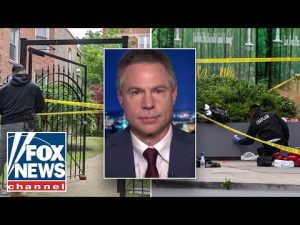In a bold move that has caught the attention of many, the Mayor of Denver recently declared his willingness to go to jail in order to block the deportation of illegal immigrants. This proclamation raises eyebrows and concerns from a variety of citizens, particularly those worried about the implications of such a stance on public health and safety. As the Mayor positions himself as a champion for those who broke the law, questions arise about what it truly means to prioritize the needs of all residents.
Some might say that the Mayor’s commitment to illegal immigrants is commendable, but the numbers tell a different story. Denver currently grapples with a staggering healthcare crisis, one that is closely linked to the rising tide of migrants flowing into the city. Uncompensated healthcare costs have skyrocketed, doubling from $60 million in 2020 to $136 million just two years later. A significant portion of this burden is felt from non-Denver residents, many of whom are illegal immigrants who rely heavily on emergency services because they lack access to routine care. It’s almost as if there’s an unwritten rule: show up with a catchphrase like “chest pain” and jump to the front of the line for an EKG—all while leaving hospitals scrambling to cover the costs.
With so many newcomers finding their way to Denver, the city’s healthcare system is feeling the pressure. Hospitals are struggling to provide necessary services, and the backlog in the emergency rooms is causing delays that could mean life or death for those in urgent need of care. It raises a poignant thought: what happens when your neighbor’s health is jeopardized because their emergency room visit is overshadowed by someone who isn’t even supposed to be in the country? The balance between compassion for individuals and the well-being of the broader community appears to be tipping dangerously.
Not only is healthcare at risk, but the housing market is feeling the strain as well. The influx of approximately 42,000 new residents, many of whom do not contribute tax revenue, has sparked concerns about rising housing costs and availability. While it might seem counterintuitive, a basic principle of economics suggests that when supply outstrips demand, prices go down. But instead, in this instance, people are feeling the crunch as living costs continue to climb. Questions arise about whether Denver’s policies are truly beneficial or if they are merely compounding existing problems.
The situation takes a darker turn when considering the implications of lax immigration policies attracting not just migrants but also gangs. The potential relocation of notorious crime organizations brings to light the very real dangers that citizens may face. One can almost imagine how criminals might see Denver as a welcoming environment, especially with a mayor willing to go to jail for them. This scenario naturally raises alarms about public safety and the lengths to which local officials are going to protect a group that by all rights should be subjected to legal scrutiny.
The crux of the issue is not that helping people is a bad thing; it’s certainly important to care for the vulnerable. However, the question remains: what kind of care should come first? Many argue that American citizens—particularly our veterans, hardworking families, and those who contribute positively to society—should be prioritized over those who have entered the country unlawfully. As local policies seem to coddle those undocumented individuals, it’s hard for many citizens to ignore the growing gulf between the help offered to these new arrivals and the unmet needs of those who have called this country home for generations. As residents of Denver pause to ponder their mayor’s choices, many can’t help but wish foundational services were fortified before extending a welcome mat to more.







